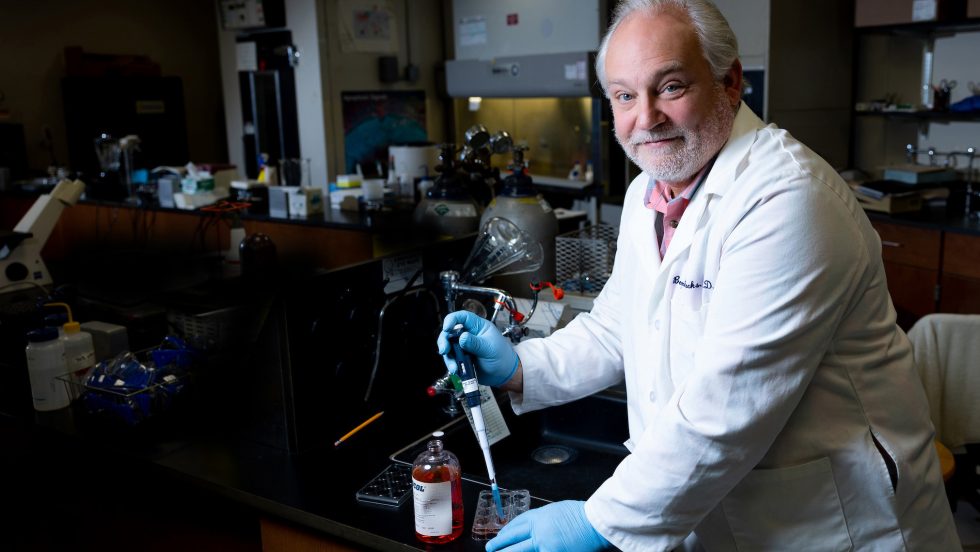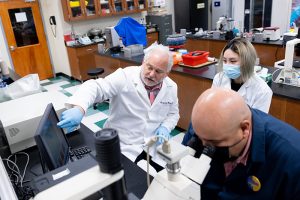
Research shows that CBD and other plant extracts could revolutionize psychological treatments.
 For Benjamin Weeks, PhD, professor of biology at Adelphi, CBD is more than a trendy new product. Along with an assortment of other plant-based substances, he believes it could radically transform the way we approach—and manage—anxiety disorders, resulting in better long-term outcomes.
For Benjamin Weeks, PhD, professor of biology at Adelphi, CBD is more than a trendy new product. Along with an assortment of other plant-based substances, he believes it could radically transform the way we approach—and manage—anxiety disorders, resulting in better long-term outcomes.
Dr. Weeks has spent the past four decades investigating what he calls “the molecular switches that signal cells to take on new functions.” One branch of that work has involved neurotrophins, which are molecules that signal cells to develop neurites. Neurite outgrowth is associated with neuroplasticity, the brain’s ability to learn by reorganizing itself and forming new neural connections.
In his search for new neurotrophins, Dr. Weeks decided to look for phytochemicals, nutrients in plants that provide health benefits, that may serve the same function. He identified several plant molecules that are neurotrophic as well as anxiolytic, meaning that they have been proven to reduce anxiety—a breakthrough find.
The anxiolytic medications prescribed today have a temporary effect on brain chemistry; symptoms of anxiety typically return when patients stop taking their medication. Phytochemicals that stimulate neuroplasticity have the potential to not just temporarily alter the brain’s chemistry, but to permanently rewire its circuitry.
Dr. Weeks documented these conclusions in a chapter titled “Physiological and Cellular Targets of Neurotrophic Anxiolytic Phytochemicals in Food and Dietary Supplements” in the book Functional Foods: Phytochemicals and Health Promoting Potential (IntechOpen, November 2021).1 Written with three Adelphi undergraduate students, the chapter explores the neuritogenic activity of plant-based anxiolytic nutraceuticals in the treatment of anxiety disorders. A number of “plant and plant extracts proven to reduce anxiety in humans in clinical trials are also able to act like neurotrophins,” they found. “Neuroplasticity offers an opportunity to use food phytochemicals along with drugs or in their place to learn to establish more appropriate responses to perceived threats by reworking neural connections.” This targeted use of neuroplastic drugs and foods “would be a tremendous advancement in the treatment of anxiety.”
Amanda Kim ’14, MS ’16, at the time a graduate student in Adelphi’s biology department, studied valerian root and other phytochemicals as part of the project. “I was most interested by the relationship between dietary supplements and neurite outgrowth, “she said. “I spent many hours in the lab performing experiments and maintaining the cells needed for the research.”
Over the years, Dr. Weeks has included both undergraduate and graduate students in his research. Many of them, like Kim, have co-authored articles on topics that have been cited hundreds of times in scholarly journals. “Seeing my students published is important to me,” he said. “I believe that taking students from hypothesis to investigation to publication is one definition of academic excellence.”
According to Dr. Weeks, his team’s work with cannabidiol, more commonly known as CBD, has generated a good deal of curiosity. He has presented his research at an international conference on neuroscience and psychiatry in Europe. “I had backed into a field that was exploding,” he said. “I found an audience that was very interested in the idea that anxiolytic neurotrophins can help rewire the brain.” A member of the American Society for Neurosciences, he also hopes to present at one of its annual meetings.
Along with a colleague from One Innovations Labs in Coral Gables, Florida, Dr. Weeks co-authored another study on the topic, “Measuring Cannabidiol Bioactivity: Neuronal Cell Survival and Neurite Outgrowth”(Cannabis Science and Technology, October 2021),2 which examines methods for assessing the neurotrophic bioactivity of CBD formulations.
With demonstrated benefits in treating pain, seizure, schizophrenia, addiction, anxiety and Parkinson’s disease, CBD is an especially promising plant-based substance. But the way CBD is prepared is important in the context of human health applications. When CBD is prepared by continuous lipid extraction and combined with vitamin C, Dr. Weeks and his co-author found, its bioactivity and neuroplastic effects are greatly improved.
Dr. Weeks is confident his findings can improve the treatment of other medical issues. A person’s decision to end an addictive behavior, for instance, requires a change in a neural pathway. Neuroplasticity can help facilitate this change. In addition, plant-based substances could even make a difference in wound care, he reports. He already has two students investigating whether CBD can stimulate the cell migration necessary for wound healing.
Footnotes:
1 Weeks, Benjamin S., and Samuel D. Weeks, Amanda Kim, et al. “Physiological and Cellular Targets of Neurotrophic Anxiolytic Phytochemicals in Food and Dietary Supplements.” Functional Foods: Phytochemicals and Health Promoting Potential, edited by Muhammad Sajid Arshad, IntechOpen, 2021.
2 Weeks, Benjamin S., and Pedro P. Perez. “Measuring Cannabidiol Bioactivity: Neuronal Cell Survival and Neurite Outgrowth.” Cannabis Science and Technology, vol. 4, iss. 8, October2021, pp. 46-56.